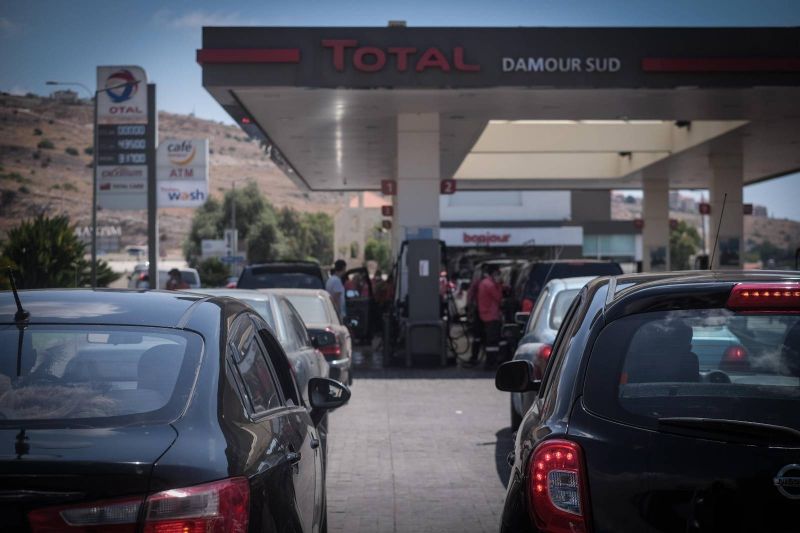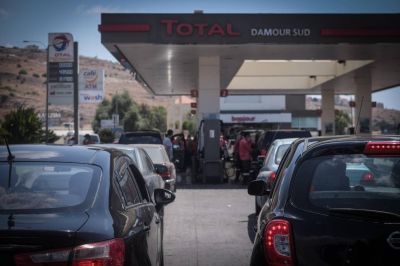
Motorists wait in line to fill their tanks. (Credit: João Sousa/L’Orient Today)
BEIRUT — In the midst of the fuel crisis, Moustapha Wehbe has found a new side hustle.
The 19-year-old university student goes to his food delivery service job during the day, comes back home at 8 p.m. and heads to the gas station line — in someone else’s car. In some cases, he waits overnight until the station opens the next morning; other times, he goes to stations that he knows have late-night hours.
On a typical evening, Wehbe grabs two bags of chips, a can of Pepsi and a plastic jug to fill with gas for his own motorcycle, and drives a client’s car to take his place in the long queue formed at a gas station in Hamra.
During the hours of waiting, he scrolls through his phone or chitchats with his new friends who are working at the station. Like many others who frequent the fuel lines, Wehbe has made friends with station employees, who sometimes help him skip the line or inform him at what time exactly he should come to save some time.
“There were two times when I had finished eating, scrolled through my phone until I had no battery, and eventually fell asleep, until an employee at the gas station woke me up,” Wehbe says.
He doesn’t mind the tedium, he said, because the side job allows him to pay his tuition and to put aside some of his earnings from his day job.
Wehbe takes a plastic gas canister with him to the station to come back home and fill his motorcycle, which he uses for his delivery job.
“I’m going to wait at the gas station [anyway] to fill my motorcycle with a fuel tank, so I might as well fill someone’s car and make money out of it,” he said. “... This side hustle has saved my life financially, with little effort from my end.”
The pay for waiting in line starts from LL60,000 and goes up depending on “how desperate the client is to fill his car, and on the status of the fuel queues on that day,” he said.
Wehbe is part of a new informal industry that has sprung out of Lebanon’s ongoing fuel crisis and the attendant “queues of humiliation” that have formed at gas stations around the country for months.
Earlier this month, the government gave its approval to another step toward removing subsidies, agreeing to finance fuel imports at an exchange rate of LL8,000 to the dollar rather than the previous rate of LL3,900. Yet the fuel is still in short supply, long queues have continued and fights at the gas stations have become increasingly common.
With the end of subsidies looming, Danielle Hatem, a financial adviser specializing in government finance, told L’Orient Today, the government has squandered the opportunity to put a more functional system in place.
“Today instead of ... using a platform to allocate coupons or [a] monthly gasoline allowance for people going to work and for taxi drivers, the government is wasting more funds,” she said, noting that the way the rationing system was set up in Lebanon has primarily benefited the rich, who consume more than the poor.
While Hatem said ending the across-the-board subsidies is a financial necessity and would help to eliminate the black market that is contributing to supply shortages, she added, “We will need to have in parallel a proper subsidy rationing plan to support the most vulnerable, including coupons or a ration card.”
In the absence of such a solution, she said, the current dysfunctional system has “pushed people to come up with potential solutions” like the industry that has sprung up around gas station queues.
In an attempt to avoid the lines, some car owners have started commissioning their building concierges to fill up for them; others have turned to the services of people like Wehbe who have made a business out of it.
Sami Lakkis, another hustler in the new fuel delivery service industry told L’Orient Today, “Last year, I lost my job as a waiter, and now I have nothing to do all day, so I started this business, and I am currently providing this service to people who know me including my neighbors and my ex-colleagues.”
On the other side of the transaction, car owners said the extra money was worth it to mitigate an increasingly unbearable and time-consuming situation.
Tarek, one of Wehbe’s clients, said that for him, the service was a time saver and allowed him to avoid buying expensive and potentially low-quality fuel on the black market. He and Wehbe are long-time neighbors, he said, so “when Moustapha told some of the neighbors that he is doing this service, I immediately jumped in.”
He added, “Although in the end I will be paying the same amount I would need to pay for a tank in the black market, I am always worried that the fuel sold on the black market is not safe.”
Karma, a mother of two who has been commissioning her concierge to fill up her car, told L’Orient Today that she has adopted the solution out of fear that at any point, clashes and gunshots might erupt at the gas station.
“I’d rather avoid this situation at any cost,” she said.
Zainab, one of Sami’s clients, told L’Orient Today, “The fuel queues are draining for me, mentally, physically, and emotionally.”
Although the price of fuel has risen sharply since the partial lifting of the subsidy and is likely to rise further at the end of September, when the current arrangement is set to expire, she said she is willing to continue paying extra to avoid the lines.
“Although the prices are gradually increasing, my patience has been decreasing in parallel with my productivity, and, to be honest, as long as I can afford this service, I will continue to go for it,” Zainab says.
